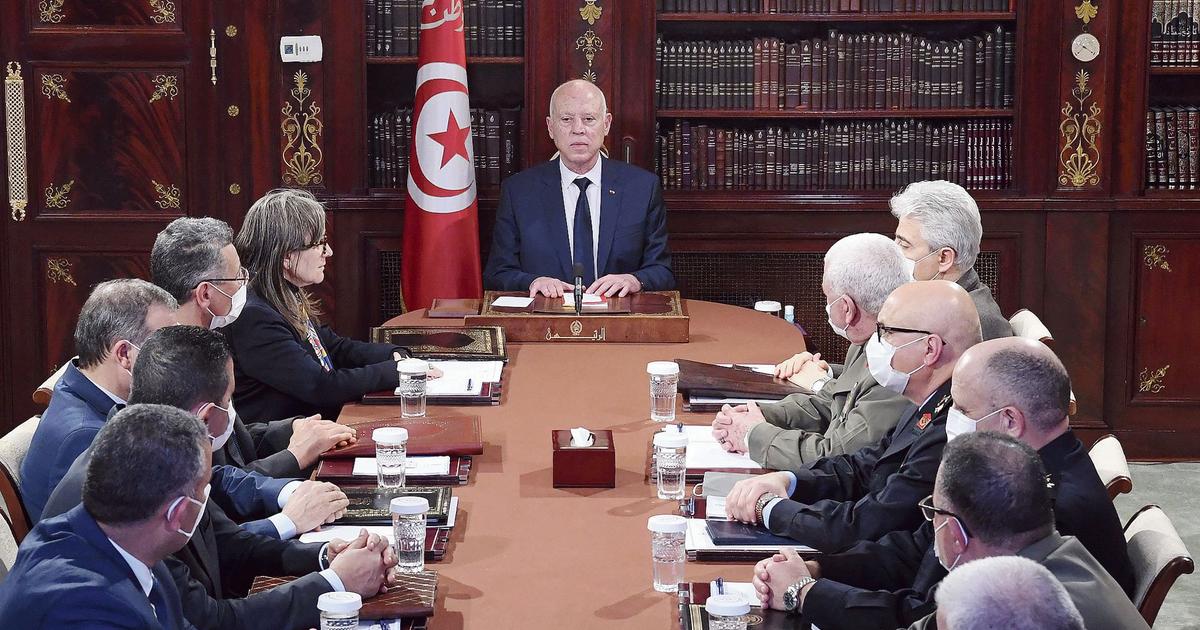Tunisia
To discover
LIVE - War in Ukraine: follow the evolution of the conflict minute by minute
This time, it's official: Kaïs Saïed has all the powers.
On Wednesday evening, the president announced the dissolution of parliament, which had been frozen for eight months.
A decision caused by the organization of a virtual plenary during which the deputies voted the end of the exceptional measures and the cancellation of the presidential decrees adopted during this period.
A look back at this never-ending Tunisian political crisis.
On July 25, 2021, Kaïs Saïed announced the freezing of the Assembly of People's Representatives (ARP), whose image was damaged by the verbal and physical disputes of the deputies elected in 2019 and by his impotence.
A few weeks later, on September 22, Kaïs Saïed assumes the right to legislate by presidential decree.
The president, who says he embodies the voice of the people, also attacks institutions he deems corrupt and inefficient.
Facing him, the opposition struggles to unite and is atomized.
It also took time for Parliament to successfully organize the March 30 plenary.
“It was the consecration of four months of effort,
explains Sayida Ounissi, deputy of Ennahdha
.
There are deputies who no longer wanted anything to do with the ARP.
It was also considered costly, in terms of image, to appear with members of Ennahdha.
One of the conditions for organizing the plenary was also the fact that Rached Ghannouchi, speaker of parliament and leader of Ennahdha, left his seat to one of his vice-presidents, Tarek Fetiti.
It's a failed coup attempt
Kais Saied
When the meeting was announced two days earlier, President Kais Saied denounced an
"illegal" attempt
.
At 12 p.m. on Wednesday, as the deputies began to connect to Zoom for their virtual session - Parliament having been cordoned off by security forces since July - the platform was suspended throughout Tunisia.
The elected officials then turned to the GotoMeeting videoconferencing application.
122 deputies out of 217 indicated their presence.
A notable participation, absenteeism being one of the scourges of this assembly.
The chairman of the session and the leaders of the parliamentary bloc had speaking time.
Many have called for early legislative elections to remedy the deadlock.
116 deputies finally voted for the cancellation of the presidential decrees issued since July 25, in particular concerning the implementation of exceptional measures,
Read also
Tunisia: President Kaïs Saïed consults citizens with MCQs
Kaïs Saïed was quick to react.
Wednesday evening, surrounded by security officers during a national security council - the second in three days - he recalled that the decisions adopted by the suspended Assembly of People's Representatives (ARP) have no legitimacy:
"It is a failed coup attempt.”
An investigation was opened for
"undermining state security"
.
As of Wednesday evening, social networks were buzzing with rumors about the arrests of deputies.
“We spent the night calling each other to check,
says Sayida Ounissi
.
Nothing is excluded today.
This Thursday, there are a lot of discussions between us on the practical aspects: preparing a small travel bag, looking for someone to take care of the people in our care…”
"Pushed to the limit"
But Kaïs Saïed did not stop there.
He also announced the dissolution of Parliament based on Article 72 of the 2014 Constitution. This provides that
"the President of the Republic is the Head of State, a symbol of his unity, he guarantees his independence and its continuity and ensures compliance with the Constitution".
The president, a former professor of constitutional law, seems to imply that the deputies undermined the unity of the state.
Read also
In Tunisia, the regime of Kaïs Saïed takes a safe turn
The actual dissolution of Parliament is not bad news for many anyway.
"We organized this plenary because we wanted to shake up the lines and get out of this unconstitutional status of this freezing of Parliament"
, explains Oussama Khlifi, president of the Qalb Tounes bloc.
“Kaïs Saïed has always refused to dissolve Parliament because he did not want to be limited by the Constitution, which provides for the organization of elections after 90 days.
He was pushed over the edge.
The objective of the deputies was to provoke a reaction from Kaïs Saïed and to destabilize his calendar
, ”said Selim Kharrat, member of the NGO al-Bawsala, which monitors public policies.
But the President of the Republic did not suggest that he was going to modify his roadmap.
This provides for a referendum on the 2014 Constitution on July 25 and legislative elections on December 17.
Until then, the state of exception, put in place on July 25, prevails.

